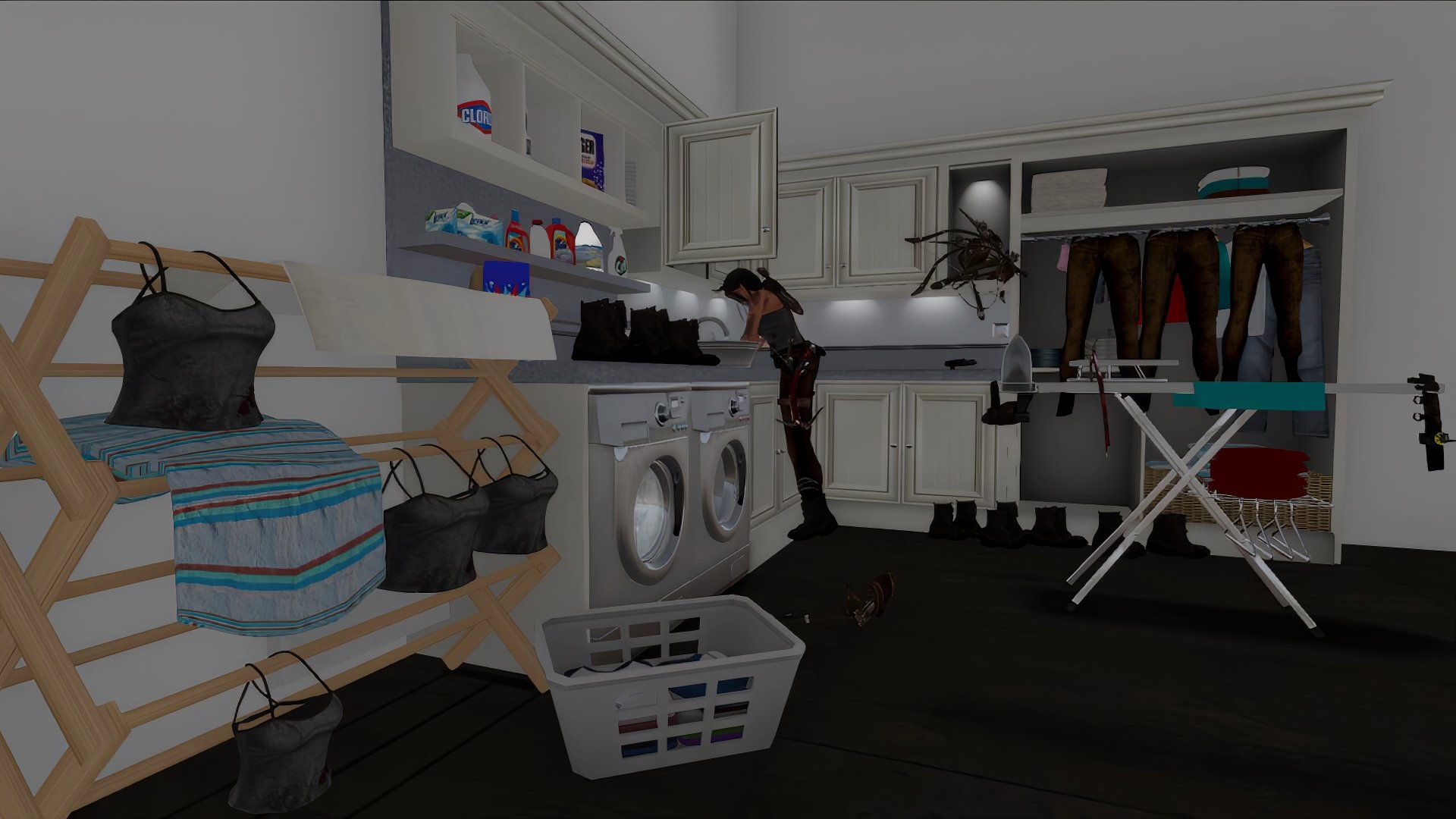As VRAL current solo exhibition focuses on Georgie Roxby Smith’s new Blood Paintings series, we aim to illuminate her legacy of confrontational game-based art by examining a pivotal early work, Lara Croft, Domestic Goddess I & II, which re-cast the Tomb Raider heroine as a proto-tradwife in her most challenging mission.
The endlessly looping cries of gaming icon Lara Croft echo incongruously over household chores in Georgie Roxby Smith’s 2013 performance and Second Life intervention, Lara Croft, Domestic Goddess I & II. The female explorer’s torture screams punctuate mundane, uneventful acts like washing and ironing clothes. The superimposition of discordant feminine spheres spotlights the bias still dogging video games’ staunchest female characters today. Despite efforts celebrating Lara Croft’s emotional depth and resolve through various reboots and remakes, her graphic anguish feels all too familiarly pinned to outmoded visions of femininity from the franchises’ past.
Having already probed systemic dangers subtly encoded for female avatars through works like The Fall Girl in 2012, here Smith spotlights the lingering identity tensions constraining Lara Croft. The Tomb Raider icon embodies a discombobulating identity bifurcation: aspiring towards fierce, capable heroism on one hand while still confined as an ornament for the traditionally masculine demographic’s visual greed alone on the other. As Croft’s strained persona splits unevenly between feminist icon and fetishized pin-up, she exemplifies unreconciled contradictions of projecting strength while submitting to the objectifying male gaze. By confronting this demeaning binary — akin to the dichotomy informing the Madonna-whore complex mapping women into mutually exclusive camps of saintly virtue or debased promiscuity — Smith indicts the media forces that tokenize liberatory gestures yet withhold full multidimensional womanhood under paternalistic pretense…
Matteo Bittanti
Works cited
George Roxby Smith, Fair Game [Run like a girl], in-game performance, machinima (color, sound, 13’ 56”), 2015.
Georgie Roxby Smith, Lara Croft, Domestic Goddess I & II, Lara Croft death noises from Tomb Raider (2013), 3D model, Second Life intervention, looped continuously for duration.
Georgie Roxby Smith, The Fall Girl, in-game performance and machinima (color, sound, 8’ 07”), 2012.
Peggy Ahwesh, She Puppet, digital video, color, sound, 15’, 2001.
This content is exclusive to Patreon subscribers. To gain full access, consider joining our vibrant community.




![George Roxby Smith, Fair Game [Run like a girl] , in-game performance, machinima (color, sound, 13' 56"), 2015](https://images.squarespace-cdn.com/content/v1/5a92a15fcef372c749ca0487/1707601223248-1BKXK9BXW7QWPV4QEM9P/run+like+a+girl1.png)
![George Roxby Smith, Fair Game [Run like a girl] , in-game performance, machinima (color, sound, 13' 56"), 2015](https://images.squarespace-cdn.com/content/v1/5a92a15fcef372c749ca0487/1707601223911-EEQIQFP8HITWQ64KVIAA/run+like+a+girl0.png)
![George Roxby Smith, Fair Game [Run like a girl] , in-game performance, machinima (color, sound, 13' 56"), 2015](https://images.squarespace-cdn.com/content/v1/5a92a15fcef372c749ca0487/1707601224615-ZHD2C5C5O2UE82G42DUN/run+like+a+girl7.png)
![George Roxby Smith, Fair Game [Run like a girl] , in-game performance, machinima (color, sound, 13' 56"), 2015](https://images.squarespace-cdn.com/content/v1/5a92a15fcef372c749ca0487/1707601225483-DK99UXSU3S2WZH6K22V0/run+like+a+girl6.png)
![George Roxby Smith, Fair Game [Run like a girl] , in-game performance, machinima (color, sound, 13' 56"), 2015](https://images.squarespace-cdn.com/content/v1/5a92a15fcef372c749ca0487/1707601226817-I97WHMBC75ZYTX19ST7G/run+like+a+girl2.png)
![George Roxby Smith, Fair Game [Run like a girl] , in-game performance, machinima (color, sound, 13' 56"), 2015](https://images.squarespace-cdn.com/content/v1/5a92a15fcef372c749ca0487/1707601227601-1K7F5QYE0LAMHEIVICGK/run+like+a+girl4.png)
![George Roxby Smith, Fair Game [Run like a girl] , in-game performance, machinima (color, sound, 13' 56"), 2015](https://images.squarespace-cdn.com/content/v1/5a92a15fcef372c749ca0487/1707601228132-UGLL56PYRS5C0KQEQ0TW/run+like+a+girl3.png)
![George Roxby Smith, 99 Problems [WASTED] , in-game performance, machinima (color, sound, 4' 45"), 2014](https://images.squarespace-cdn.com/content/v1/5a92a15fcef372c749ca0487/1707481097134-Q9K31ND3GTC16YGOLLJX/Roxby+Smith_99problems_15.png)
![George Roxby Smith, 99 Problems [WASTED] , in-game performance, machinima (color, sound, 4' 45"), 2014](https://images.squarespace-cdn.com/content/v1/5a92a15fcef372c749ca0487/1707481101079-3560FNG2Z8RN1S3LQGLA/Roxby+Smith_99problems_16.png)
![George Roxby Smith, 99 Problems [WASTED] , in-game performance, machinima (color, sound, 4' 45"), 2014](https://images.squarespace-cdn.com/content/v1/5a92a15fcef372c749ca0487/1707481099696-UZ7U3ZUL2UX4ARZLI3UL/Roxby+Smith_99problems_3.png)
![George Roxby Smith, 99 Problems [WASTED] , in-game performance, machinima (color, sound, 4' 45"), 2014](https://images.squarespace-cdn.com/content/v1/5a92a15fcef372c749ca0487/1707481088316-D58VZM5S8RFLEFENOOUZ/Roxby+Smith_99problems_23.jpeg)
![George Roxby Smith, 99 Problems [WASTED] , in-game performance, machinima (color, sound, 4' 45"), 2014](https://images.squarespace-cdn.com/content/v1/5a92a15fcef372c749ca0487/1707481090030-RMVV55A34LDM3VAXL6PN/Roxby+Smith_99problems_24.jpeg)
![George Roxby Smith, 99 Problems [WASTED] , in-game performance, machinima (color, sound, 4' 45"), 2014](https://images.squarespace-cdn.com/content/v1/5a92a15fcef372c749ca0487/1707481090826-KGRC5WF2TFB8S9MQ5564/Roxby+Smith_99problems_25.jpeg)
![George Roxby Smith, 99 Problems [WASTED] , in-game performance, machinima (color, sound, 4' 45"), 2014](https://images.squarespace-cdn.com/content/v1/5a92a15fcef372c749ca0487/1707481092619-I8S0P9MJUC52T4RSUKQO/Roxby+Smith_99problems_21.jpeg)
![George Roxby Smith, 99 Problems [WASTED] , in-game performance, machinima (color, sound, 4' 45"), 2014](https://images.squarespace-cdn.com/content/v1/5a92a15fcef372c749ca0487/1707481094660-M0V0C0TBPHY3LIWETTAI/Roxby+Smith_99problems_22.jpeg)
![George Roxby Smith, 99 Problems [WASTED] , in-game performance, machinima (color, sound, 4' 45"), 2014](https://images.squarespace-cdn.com/content/v1/5a92a15fcef372c749ca0487/1707481091786-33OF5VKN0J74HW7EJ147/Roxby+Smith_99problems_26.jpeg)
![George Roxby Smith, 99 Problems [WASTED] , in-game performance, machinima (color, sound, 4' 45"), 2014](https://images.squarespace-cdn.com/content/v1/5a92a15fcef372c749ca0487/1707481095812-WZ8PQG26MGQ2R2FFL911/Roxby+Smith_99problems_2.png)
![George Roxby Smith, 99 Problems [WASTED] , in-game performance, machinima (color, sound, 4' 45"), 2014](https://images.squarespace-cdn.com/content/v1/5a92a15fcef372c749ca0487/1707481098359-EHIS9H1BBAJ4QCJM42H5/Roxby+Smith_99problems_9.png)
![George Roxby Smith, 99 Problems [WASTED] , in-game performance, machinima (color, sound, 4' 45"), 2014](https://images.squarespace-cdn.com/content/v1/5a92a15fcef372c749ca0487/1707481139980-8CSQ1YXZL1U3H52IV8ZU/Roxby+Smith_99problems_17.png)
![George Roxby Smith, 99 Problems [WASTED] , in-game performance, machinima (color, sound, 4' 45"), 2014](https://images.squarespace-cdn.com/content/v1/5a92a15fcef372c749ca0487/1707481146060-46QTDPW5H88CV5GEVTTO/Roxby+Smith_99problems_12.png)
![George Roxby Smith, 99 Problems [WASTED] , in-game performance, machinima (color, sound, 4' 45"), 2014](https://images.squarespace-cdn.com/content/v1/5a92a15fcef372c749ca0487/1707481145259-LMH3BGZABOBU3HEJJE5J/Roxby+Smith_99problems_10.png)
![George Roxby Smith, 99 Problems [WASTED] , in-game performance, machinima (color, sound, 4' 45"), 2014](https://images.squarespace-cdn.com/content/v1/5a92a15fcef372c749ca0487/1707481102838-5KBD9ZNGTATJML1N2AR0/Roxby+Smith_99problems_18.png)
![George Roxby Smith, 99 Problems [WASTED] , in-game performance, machinima (color, sound, 4' 45"), 2014](https://images.squarespace-cdn.com/content/v1/5a92a15fcef372c749ca0487/1707481103944-HE2U036ICLWRLCALKBD4/Roxby+Smith_99problems_13.png)
![George Roxby Smith, 99 Problems [WASTED] , in-game performance, machinima (color, sound, 4' 45"), 2014](https://images.squarespace-cdn.com/content/v1/5a92a15fcef372c749ca0487/1707481105933-2W6F8YDC1GTR51AOZDGY/Roxby+Smith_99problems_14.png)
![George Roxby Smith, 99 Problems [WASTED] , in-game performance, machinima (color, sound, 4' 45"), 2014](https://images.squarespace-cdn.com/content/v1/5a92a15fcef372c749ca0487/1707481140475-VC4Q9ERH73Q24832WTHD/Roxby+Smith_99problems_0.png)
![George Roxby Smith, 99 Problems [WASTED] , in-game performance, machinima (color, sound, 4' 45"), 2014](https://images.squarespace-cdn.com/content/v1/5a92a15fcef372c749ca0487/1707481148477-4UEBN9J2TTT2RLLHAS7N/Roxby+Smith_99problems_11.png)